News
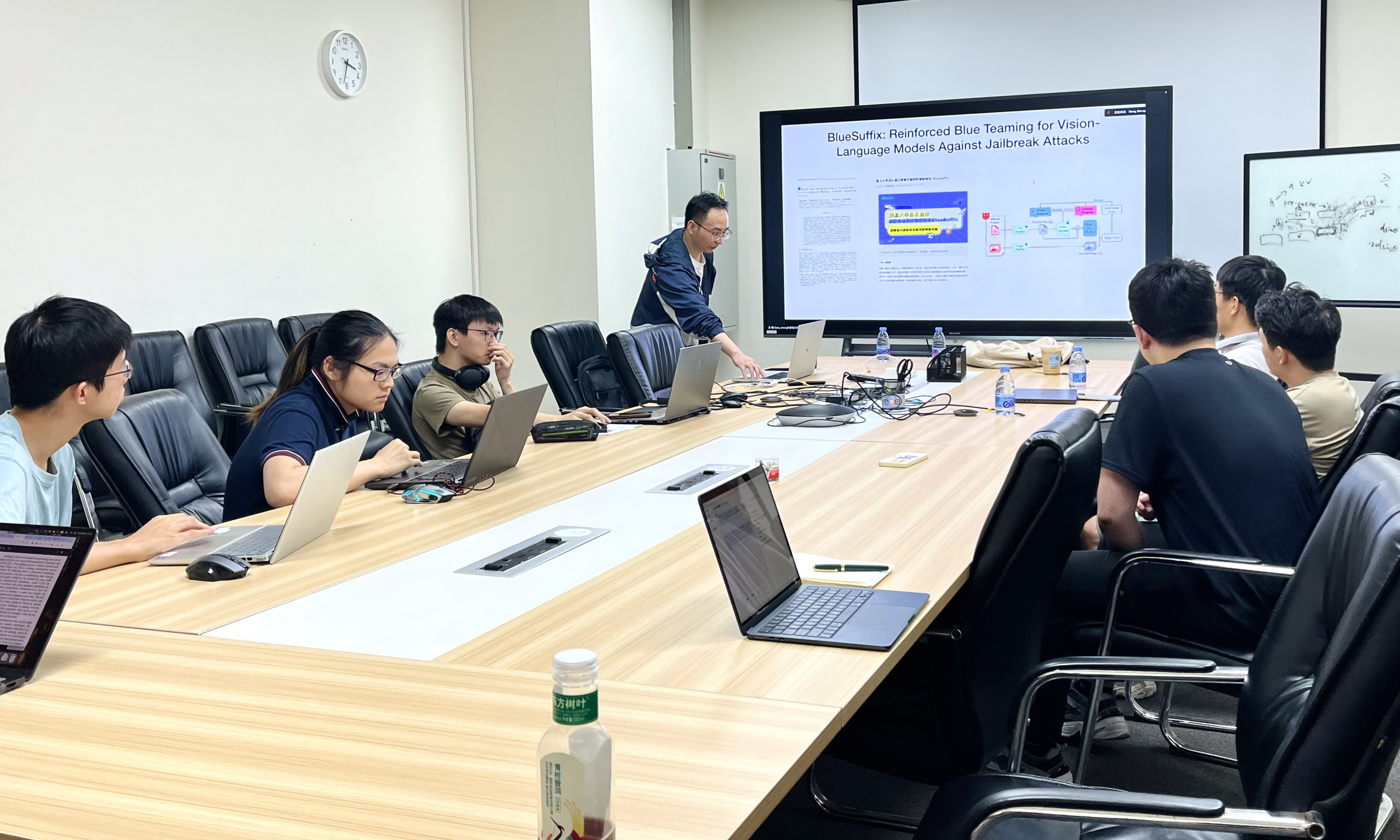
2025-06-03
Postdoctoral Researcher Xiang Zheng from City University of Hong Kong Delivers an Academic Report
On May 28, 2025, at the invitation of Jianyu Niu, Research Assistant Professor of The Research Institute of Trustworthy Autonomous Systems (RITAS) at Southern University of Science and Technology, Postdoctoral researcher Xiang Zheng from City University of Hong Kong delivered an academic report on "Reinforcement Learning-Based Adversarial Evaluation and Defense Enhancement for Large Language Models (LLM) " in Room 443B of the South Tower of the College of Engineering. Figure 1 XiangZheng presents an academic report At present, LLM has been more deeply applied in customer service, law, healthcare, and other fields based on its ability of understanding, reasoning, programming, planning and decision-making. While enhancing performance, ensuring LLM security has emerged as a critical concern. Based on this background, Xiang Zheng focused on the perspective of security assessment and introduced the technical framework, lightweight tools and defense solutions of LLM security assessment to the teachers and students present. Reinforcement Learning-Based Adversarial Evaluation and Defense Enhancement for LLM refers to evaluating the fault tolerance boundary of LLM under malicious input through adversarial testing, such as modifying prompt words and injecting noise, optimizing attack strategies using reinforcement learning algorithms to discover vulnerabilities, and designing defense mechanisms to enhance model robustness. In the report, Xiang Zheng introduced a series of recent related work, such as the curiosity-driven LLM black-box audit framework (CALM), the black-box defense mechanism using VLMs to resist jailbreak attacks (BlueSuffix), and the multi-dimensional systemic security evaluation that is closer to real scenarios (ROSE). Figure 2 Technical Architecture of BlueSuffix After the report, the teachers and students engaged in technical dialogues around the core topics of the report and combined with their own research directions. Xiang Zheng systematically responded to the questions raised by teachers and students from the dimensions of technical implementation, experimental verification and industry application. The report ended successfully in a lively academic dialogue.
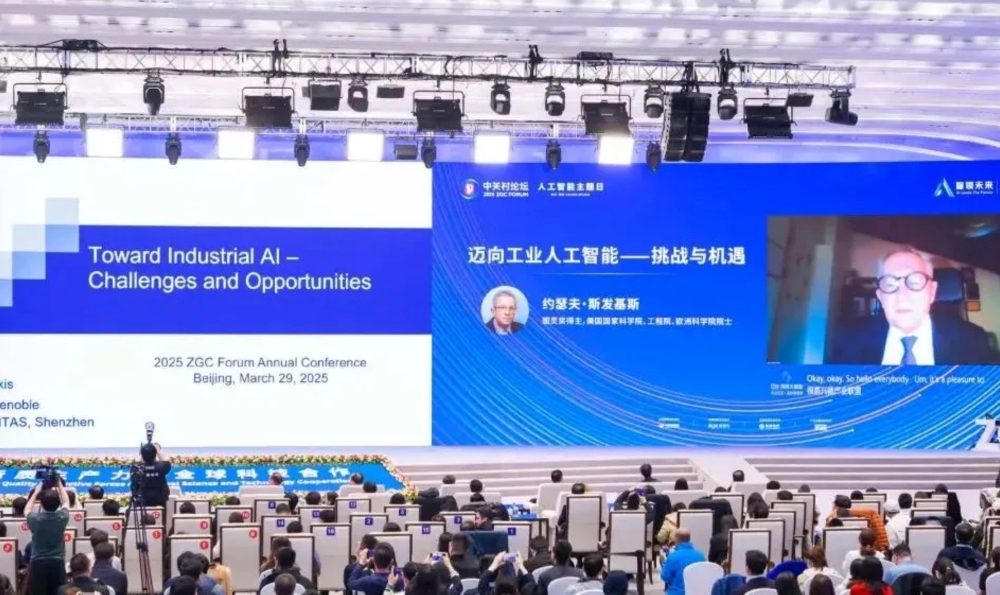
2025-05-20
Turing Award winner Joseph Sifakis: Toward Industrial AI- Challenges and Opportunities
Pro. Joseph Sifakis talks about "Toward Industrial AI- Challenges and Opportunities" at 2025 ZGC Forum Annual Conference hosted by BAAI

2025-04-17
Professor Sotirios Bisdas from the University of Tübingen, Germany, Visited RITAS
On April 14, 2025, an academic lecture titled "Trustworthiness and Applications of AI in Clinical Oncology" was successfully held at Room 812, South Tower, College of Engineering, Southern University of Science and Technology (SUSTech). The lecture was organized by the Research Institute of Trustworthy Autonomous Systems (RITAS) and delivered by Professor Sotirios Bisdas, a Radiology professor at the University of Tübingen, Germany, and the Director of Neurology and Neuroradiology at UCL, UK. The session was chaired by Professor Jianguo Zhang from RITAS at SUSTech, with members of the CVIP(Computer Vision and Image Processing) team also attending. In the lecture, Professor Bisdas provided a detailed introduction to the trustworthiness and applications of artificial intelligence (AI) in clinical oncology. He focused on how AI plays a significant role in early cancer detection, treatment planning, and patient prognosis assessment. Professor Bisdas emphasized that AI technologies are rapidly transforming the field of oncology care, enabling more efficient clinical workflows while reducing the costs and time consumption associated with traditional methods. He highlighted that AI’s multimodal learning and multi-omics integration could accelerate cancer drug discovery and the development of treatment plans, providing new solutions for precision medicine. Furthermore, Professor Bisdas outlined the future directions for AI in oncology. He suggested that future research should focus on further optimizing the reliability, transparency, and interpretability of AI models, particularly in terms of cross-domain applications and integration with human health. He also pointed out the importance of enhancing AI’s generalization capabilities to improve its practical clinical performance, while simultaneously reducing the need for labeled data. Professor Jianguo Zhang highly praised Professor Bisdas's lecture and expressed his anticipation for continued collaboration between their teams to further promote the innovative application of AI in medical imaging and oncology. Following the lecture, Professor Bisdas visited the CVIP Laboratory established by Professor Jianguo Zhang, where he engaged in friendly interactions and academic discussions with the CVIP research team. Professor Bisdas expressed his hope to strengthen future academic exchanges and facilitate mutual visits between the two teams, laying the groundwork for comprehensive collaboration between their laboratories. Professor Bisdas’ visit not only provided a valuable platform for RITAS’s researchers and students to learn and exchange ideas, but it also strengthened academic cooperation between SUSTech and leading international experts in the field of medical AI.

2025-04-16
Professor Rafael Muñoz-Salinas from the University of Córdoba Delivers a Comprehensive Lecture on Fiducial Markers
On April 14, 2025, Professor Rafael Muñoz-Salinas from the University of Córdoba, Spain, invited by Associate Professor Shiqi Yu from the Research Institute of Trustworthy Autonomous Systems (RITAS) delivered a talk on fiducial markers to faculties and students at SUSTech. Fiducial markers are high-contrast visual tags used for object localization and pose estimation, which play an essential role in fields such as robotics, augmented reality, and autonomous systems. Professor Muñoz-Salinas is the creator of the widely used ArUco marker, one of the fiducial markers. With years of research experience in fiducial markers, Professor Muñoz-Salinas shared recent advancements in fiducial markers, including work on enhancing marker detection in low-light and noisy environments using deep learning techniques. He also introduced his team’s latest developments in the design of 3D and customizable fiducial markers. These innovations aim to bridge the gap between technical precision and practical usability in real-world applications. Following the lecture, several students presented their own work on fiducial markers to Professor Muñoz-Salinas, including a new deep learning model for fiducial markers, QR codes etc.,and Professor Muñoz-Salina gave suggestions on how to improve their work. This led to in-depth discussions and valuable exchanges of ideas between the students and the professor, strengthening the collaboration between the two research groups.

2025-04-15
Online Research Work Meeting of RITAS was Held
An online research work meeting of the Research Institute of Trustworthy Autonomous Systems (RITAS) was held on April 11, 2025. Attendees included Prof. Joseph Sifakis (Director of RITAS), Prof. Qi Hao (Executive Director of RITAS), Prof. Ke Tang (Member of the Management Committee and Head of the Department of Computer Science and Engineering), Chair Professor Jiang Liu, and center directors, Prof. Yinqian Zhang, Associate Prof. Yepang Liu, Associate Prof. Xuan Song, as well as other faculty members. The meeting was chaired by Prof. Qi Hao. During the meeting, the director of each research center first presented reports on their teams’ current status, research topics, project progress, funding arrangements, main research directions, societal contributions, and future plans. Prof. Joseph Sifakis expressed full recognition of the recent research achievements made by each center and provided constructive feedbacks. He emphasized the societal impacts of research outcomes and encouraged more collaborative activities among the centers. Prof. Sifakis proposed organizing an industry-university interaction event in October 2025, inviting industry partners to visit the institute and suggesting that each center showcase their research results through demonstrations and presentations to promote more collaborations. He also recommended developing an advanced AI infrastructure for RITAS to support significant scientific innovations and enhance research efficiency and technology transfer capabilities. Prof. Qi Hao summarized the meeting and suggested holding monthly cross-center seminars, where faculty and students could participate in discussions on specific topics to further strengthen academic exchange. The directors of five centers actively contributed ideas and suggestions for the future development of RITAS.This meeting helps RITAS to well arrange its next half a year’s research activities.

2025-04-04
Executive Director Professor Qi Hao Invited to Deliver Keynote Speech at "Conference on University-Enterprise Collaborative Innovation Talent Cultivation Exchange"
The second "University-Enterprise Collaborative Innovation Talent Cultivation Exchange Conference" was held at the Conference Center of the Southern University of Science and Technology (SUSTech) on the afternoon of April 3, 2025. Centered around the theme of "Gathering Wisdom in Southern Guangdong, Creating the Future with Talent," the conference featured six parallel sessions: "Advanced Materials", "Optoelectronics", "Artificial Intelligence", "Integrated Circuits", "Biopharmaceuticals", and "Tech Finance". Scholars and industry experts gathered to discuss reforms in innovative talent cultivation models. At the "Artificial Intelligence Driving Interdisciplinary Collaborative Ecosystem Construction" sub-forum, Professor Qi Hao, Executive Director of the Research Institute of Trustworthy Autonomous Systems (RITAS), and a faculty member of the Department of Computer Science and Engineering, chaired the session and delivered a keynote speech. Attendees included Associate Professor Jin Zhang, Deputy Head of the Department of Computer Science and Engineering; Yingjie Han, Administrative Vice Dean of Shuren College; and representatives from over 20 enterprises, such as China Unicom Global Limited (Shenzhen Branch) and XGD INC. During his keynote speech, Executive Director Pro. Qi Hao provided a comprehensive introduction to RITAS, covering its founding background, research centers, teams, scientific achievements, collaborative projects, and future plans of RITAS. He expressed his welcome for industry experts to visit RITAS, participate in technical exchanges, and explore research collaborations in trustworthy and autonomous systems to facilitate the practical application of RITAS’s findings. Additionally, he encouraged corporate experts to conduct on-campus seminars on employment interviews, career planning, and psychological counseling, offering targeted guidance to students before they enter the workforce and fostering a new ecosystem for university-enterprise integration in innovative talent cultivation. At the conference, participants shared insights on university and corporate developments and engaged in lively discussions on topics such as "building university-enterprise collaboration mechanisms, exploring talent cultivation models through industry-education integration, and coordinating talent supply-demand mechanisms between universities and enterprises in the AI era." This event established a communication platform for university-enterprise collaboration, laying a solid foundation for SUSTech to further deepen industry-education integration and enhance the quality of innovative talent cultivation.
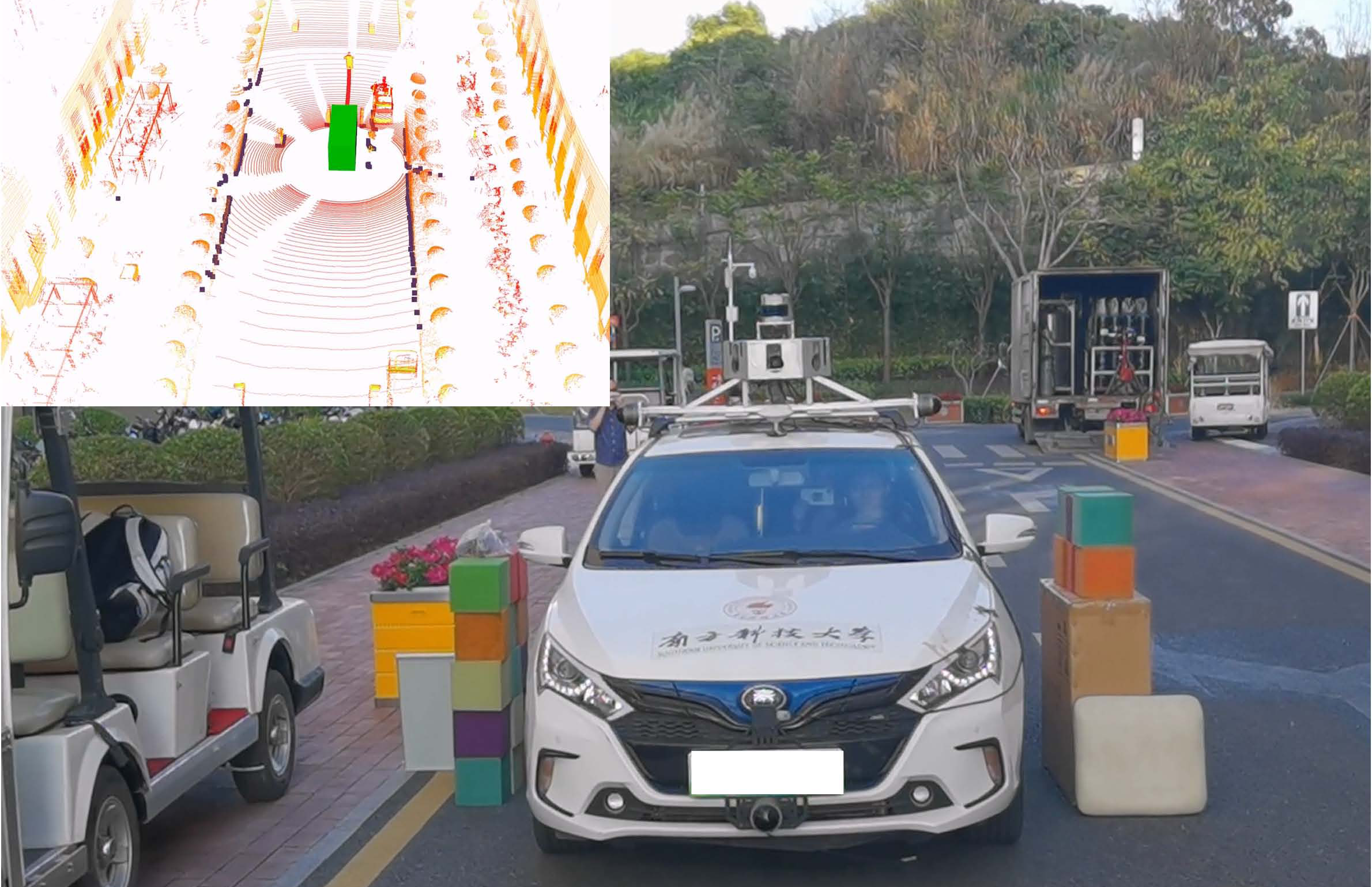
2025-03-25
SUSTech Qi Hao’s team has published latest findings in IEEE Transactions on Robotics
Recently, Professor Hao Qi’s team from the Research Institute of Trustworthy Autonomous Systems (RITAS) at Southern University of Science and Technology(SUSTech) published a paper titled “NeuPAN: Direct Point Robot Navigation with End-to-End Model-based Learning” in IEEE Transactions on Robotics—a top-tier journal in the field of robotics. Navigating a nonholonomic robot in a cluttered, unknown environment requires accurate perception and precise motion control for real-time collision avoidance. This paper presents NeuPAN: a real-time, highly accurate, map-free, easy-to-deploy, and environment-invariant robot motion planner. Leveraging a tightly coupled perception-to-control framework, NeuPAN has two key innovations compared to existing approaches: 1) it directly maps raw point cloud data to a latent distance feature space for collision-free motion generation, avoiding error propagation from the perception to control pipeline, resulting in high accuracy control actions. 2) it is interpretable from an end-to-end model-based learning perspective. Thus, it is generalizable to diverse situations without requiring extensive hands-on engineering. The crux of NeuPAN is solving an end-to-end mathematical model with numerous point-level constraints using a plug-and-play (PnP) proximal alternating-minimization network (PAN), incorporating neurons in the loop. This allows NeuPAN to generate realtime, physically interpretable motions. It seamlessly integrates data and knowledge engines, and its network parameters can be fine-tuned via backpropagation. Fig.1 Wheel-legged robot mapless navigation in the office empowered by NeuPAN The team conducted extensive comparative experiments in extensive simulated and real-world environments, including We ground mobile robots, wheel-legged robots, and autonomous vehicles. Results demonstrate that NeuPAN outperforms existing baselines in terms of accuracy, efficiency, robustness, and generalization capabilities across various environments, including the cluttered sandbox, office, corridor, and parking lot. We show that NeuPAN works well in unknown and unstructured environments with arbitrarily shaped objects, transforming impassable paths into passable ones, and demonstrating outstanding navigation and collision avoidance performance Fig.2 Real-world experiment of autonomous vehicle navigation through both a parking lot and a narrow passage Fig.3 Trajectory comparison of manual and NeuPAN control in a structured real-world testbed Professor Hao Qi and Associate Professor Jia Pan from the University of Hong Kong serve as the co-corresponding authors of the paper. IEEE Transactions on Robotics is recognized as one of the world’s top-tier international journals in the field of robotics. It requires papers to make significant contributions to both the theoretical aspects and engineering practices in robotics. With approximately 100 papers published globally each year, the journal represents major advancements in robotics, and many landmark works in navigation and planning are featured in its issues.
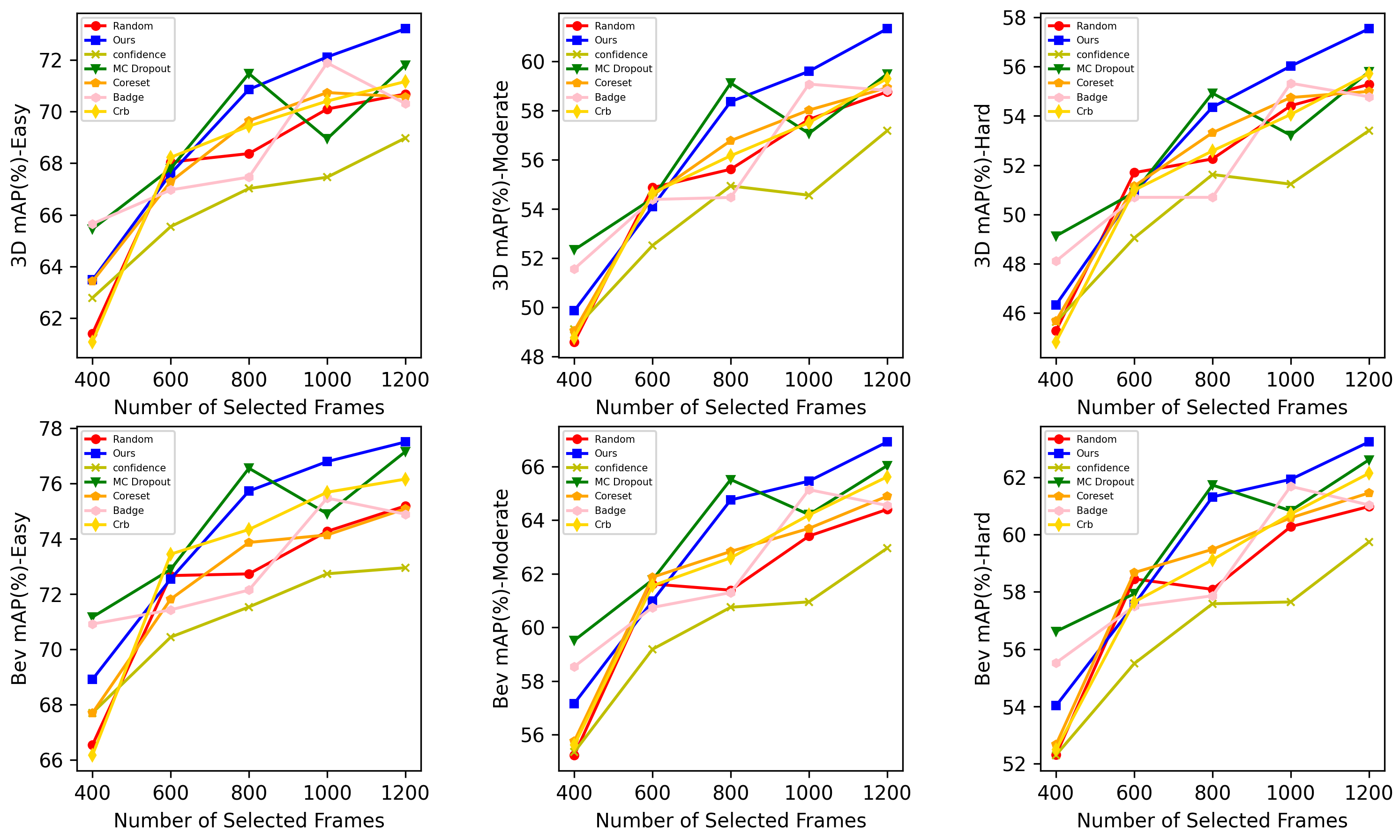
2025-03-25
SUSTech Qi Hao's team has published latest researches in IEEE Transactions on Intelligent Transportation Systems (T-ITS)
Hao Qi Research Group within the Autonomous Driving Center of the Research Institute of Trustworthy Autonomous Systems (RITAS), Southern University of Science and Technology (SUSTech), in collaboration with the University of Macau, and Shenzhen DeepRoute.AI Company, has published a research article titled “TSceneJAL: Joint Active Learning of Traffic Scenes for 3D Object Detection” in the prestigious journal IEEE Transactions on Intelligent Transportation Systems (T-ITS). In autonomous driving, 3D object detection relies on high-quality, precisely annotated datasets. However, the annotation process is labor-intensive and costly. Active learning presents a promising solution by selecting a small but informative subset of unlabeled data for annotation, reducing costs while maintaining model performance. Despite this, traditional active learning methods often struggle with issues such as class imbalance, scene redundancy, and insufficient complexity in autonomous driving datasets. Fig. 1 An illustration of our proposed TSceneJAL framework To tackle these challenges, the research team proposed an innovative three-stage joint active learning framework called TSceneJAL, as shown in Fig.1. This framework dynamically optimizes balance, diversity, and complexity in data selection to achieve the goal of training an optimal model with minimal annotated data. 1)Class Entropy Sampling: Selects scenes with multiple object classes to mitigate class imbalance. 2)Scene Graph Similarity Measurement: Traffic scenes are modeled as directed graphs (with nodes representing object classes and edges representing spatial distances). Utilizes the MarginalizeKernel algorithm to measure graph similarity and eliminate redundant scenes. 3)Uncertainty Sampling using a Mixture Density Network: A mixture Gaussian distribution network is incorporated into the detection model to simultaneously estimate data noise uncertainty (aleatoric uncertainty) and model epistemic uncertainty, prioritizing the selection of complex scenes with high uncertainty.Experimental results across multiple datasets demonstrate that TSceneJAL achieves state-of-the-art performance in active learning for 3D object detection, as shown in Fig.2. Compared to existing methods, the framework improves several key metrics, including 3D mean average precision (3D-mAP) by up to 11%; annotating only 32% of the KITTI dataset is sufficient to achieve 92% of the detection performance obtained with the full dataset; and detection accuracy for classes such as pedestrians and cyclists is improved by 10–15%, effectively mitigating the class imbalance issue. Fig. 2 Experiment results of different AL methods with an increasing number of scenes on the KITTI Research Assistant Professor Meiying Zhang and Professor Qi Hao are the co-corresponding authors, and Chenyang Lei, a master's student in the Department of Computer Science and Technology, SUSTech, is the first author. T-ITS is one of the most influential international top-tier journals in the field of intelligent transportation systems, dedicated to pioneering advancements in intelligent transportation theories, technologies, and applied breakthroughs.
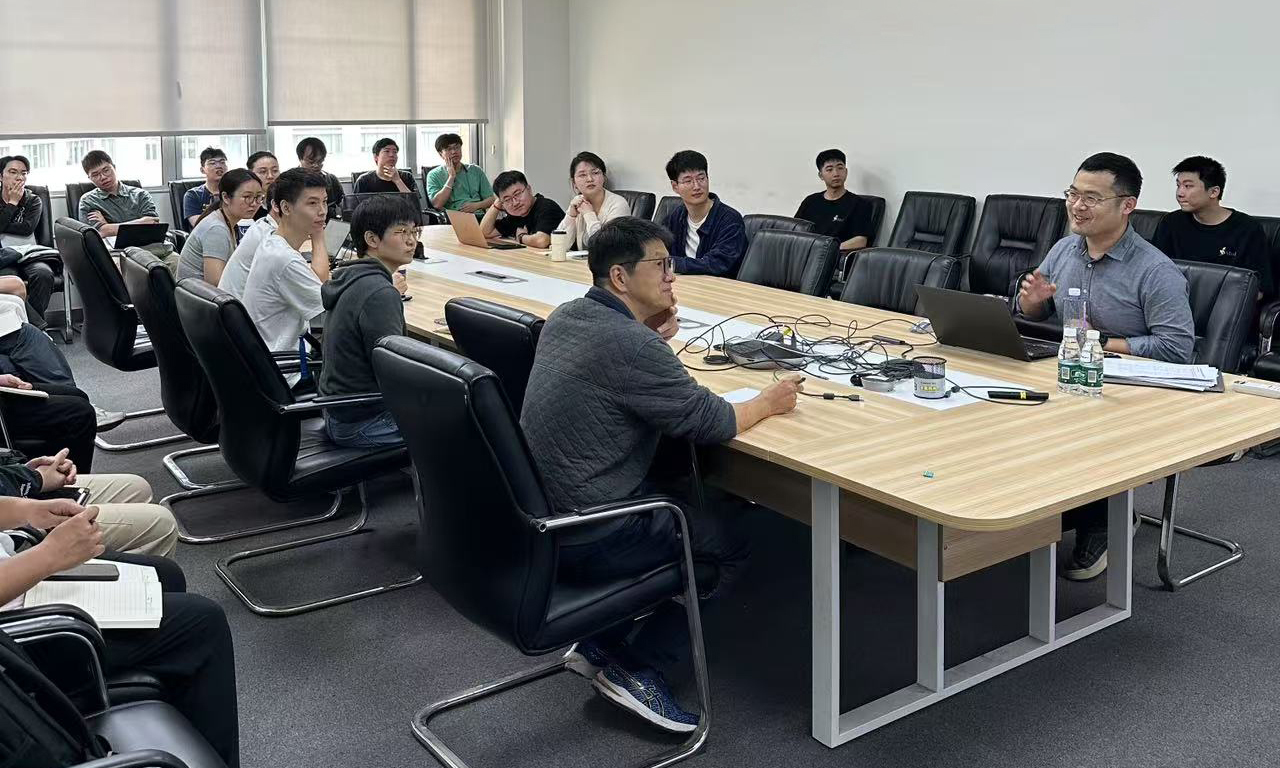
2025-03-19
Shandong University Researcher Dr. Xu Yanyu Delivers Distinguished Academic Lecture at SUSTech
On March 14, 2025, the Research Institute for Trustworthy Autonomous Systems at the Southern University of Science and Technology (SUSTech) hosted a compelling academic lecture titled "Resource-Efficient Learning Based on Few Training Labels and Few Training Parameters." The presentation, delivered by Dr. Xu Yanyu, a prominent researcher from Shandong University, took place in Conference Room 443B of the South Building, College of Engineering. Professor Liu Jiang, Director of the Intelligent Medical Centre at the Research Institute, chaired the event, which was attended by members of the iMED team. During his comprehensive presentation, Dr. Xu elaborated on his groundbreaking achievements in image and video representation learning, resource-efficient learning methodologies, and medical foundation models. He specifically addressed innovative approaches to enhance model performance through efficient learning techniques when facing limited annotation resources. Dr. Xu emphasized that as medical imaging data continues to expand exponentially, traditional annotation and training methodologies face significant cost constraints. His proposed strategies, however, demonstrate the ability to achieve high-precision predictive results while substantially reducing annotation and computational resource requirements. Dr. Xu also outlined promising future research directions, highlighting the potential of Model Merging and Resource Efficient Learning. He suggested that expanding a single model's task domain and optimizing training efficiency through advanced model merging techniques could significantly enhance model generalizability and accuracy. Furthermore, he underscored the critical importance of exploring novel approaches that maintain or improve model performance while minimizing annotation demands. Professor Liu Jiang commended Dr. Xu's presentation and expressed enthusiasm for fostering deeper collaborative research initiatives between their respective teams. The lecture was followed by a dynamic discussion session, during which participants acknowledged the valuable insights and reference frameworks provided for future research endeavors. This academic exchange not only offered an exceptional learning platform for attending researchers and students but also strengthened the scholarly collaboration between the iMED team and Dr. Xu's research group.

2024-05-06
Distinguished Visiting Professor of SUSTech Joseph Sifakis elected as international member of U.S. National Academy of Sciences
The National Academy of Sciences (NAS) of the United States recently announced the election of 120 members and 24 international members in recognition of their distinguished and continuing achievements in original research. Among them, Joseph Sifakis, Distinguished Visiting Professor of the Southern University of Science and Technology (SUSTech), was elected as an international member of NAS. Joseph Sifakis is a member of the French Academy of Sciences, the French National Academy of Engineering, Academia Europea, and the American Academy of Arts and Sciences. With a career dedicated to research in software engineering, embedded systems, and formal verification, he has achieved original and pioneering breakthroughs in these fields. His contributions include the development of novel theories and methodologies in model checking, effectively applied in industry for real-time system security verification. In 2007, he was honored with the Turing Award by the Association for Computing Machinery (ACM) for his outstanding contributions to model checking theory and practice. Joining SUSTech in 2019 as a Distinguished Visiting Professor within the Department of Computer Science and Engineering, Joseph Sifakis also holds the position of Dean of the Research Institute of Trustworthy Autonomous Systems (RITAS). RITAS, under Professor Joseph Sifakis’s leadership, spearheads research in trusted intelligent autonomous systems, exploring key frontiers such as computational intelligence, trusted software, autonomous driving, smart cities, and smart healthcare. Through pioneering research in cutting-edge artificial intelligence technologies, RITAS aims to foster the development of scientific and technological talent and contribute to the industrial advancement of Shenzhen. Related link: https://www.nasonline.org/news-and-multimedia/news/2024-nas-election.html



